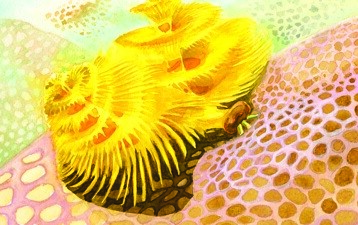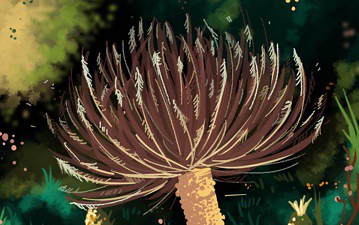Annelida

Earthworm
Lumbricus terrestris



2 POINTS
• Lumbricus terrestris has a MOVE of 1.
Cool, Warm
Graphic by Pedro Miguel do Nascimento Veliçavelica.deviantart.com/
Photo by Jackhynesen.wikipedia.org/wiki/File:Mating_earthworms.jpg
Lumbricus terrestris is a large, reddish worm native to Europe[citation needed], but now also widely distributed elsewhere around the world (along with several other lumbricids) due to human introductions. In some areas where it has been introduced, some people consider it to be a serious pest species since it is outcompeting native worms. Through much […] read more

Christmas Tree Worm
Spirobranchus giganteus


Sorry, there is no photo available. If you have one, please submit
here
.
6 POINTS
• Spirobranchus giganteus is a SUSPENSION FEEDER, and needs to be played adjacent to at least 1 compatible PLANKTON SPECIES.
warm
Graphic by Melissa Guionwww.melissaguion.com
Spirobranchus giganteus, commonly known as Christmas tree worms, are small, tube-building polychaete worms belonging to the family Serpulidae. The worm is aptly named; both its common and Latin names refer to the two chromatically hued spiral structures, the most common feature seen by divers. Actually, the multicolored spirals are merely the worm’s highly derived respiratory structures. S. giganteus […] read more

Feather Duster Worm
Sebellastarte magnifica


Sorry, there is no photo available. If you have one, please submit
here
.
5 POINTS
• Sebellastarte magnifica is a SUSPENSION FEEDER, and needs to be played adjacent to at least 1 compatible PLANKTON SPECIES.
cool, warm
Graphic by Maki Narosci-ence.org
Sabellidae (feather duster worms) are sedentary marine polychaete tube worms where the head is mostly concealed by feathery branchiae. They build tubes out of parchment, sand, and bits of shell. They tend to be common in the intertidal zones around the world. Feather-duster worms have a crown of feeding appendages or radioles in two fan-shaped clusters projecting […] read more

Earthworm
Lumbricus terrestris


Sorry, there is no photo available. If you have one, please submit
here
.
3 POINTS
Play: Lumbricus terrestris has a MOVE of 1
Fact: Lumbricus terrestris plays a major role in enriching soil by breaking down organic matter like dead leaves.
cool, warm
Graphic by Kyu Hwangkyuhwang.com/
Earthworms Lumbricus terrestris, the Common Earthworm Scientific classification Kingdom: Animalia Phylum: Annelida Class: Clitellata Order: Haplotaxida Suborder: Lumbricina Burmeister, 1837 Families Acanthodrilidae Ailoscolidae Alluroididae Almidae (disputed) Criodrilidae Eudrilidae Exxidae Glossoscolecidae Hormogastridae Lumbricidae Lutodrilidae Megascolecidae Microchaetidae Ocnerodrilidae Octochaetidae Sparganophilidae Earthworm is the common name for the largest members of Oligochaeta (which is either a class or […] read more